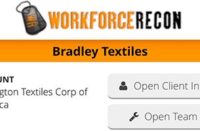No matter what industry you’re in, whether it’s massage therapy, concrete staining or stamped concrete, you have to consider yourself as being in sales. People need to think of your product over other products when they are given a choice. Joining your local Chamber of Commerce, advertising online, or becoming a member of a construction trade group are smart traditional marketing strategies. However, there are less obvious ways to enhance what you might already be doing for marketing and take some new tacks to reach your target audience.
We spoke with experts in commercial, industrial and residential decorative concrete to uncover new ways to get the word out about your business.
1. Put your portfolio on a tablet
For decorative concrete, visual marketing strategies will do the most good. Michelle Radley, co-owner of New Jersey-based JM Lifestyles, knows the importance of having a portfolio. “I would carry it around with me because I would be somewhere socially and people always ask, “What do you do?’” she says. “If you just say ‘I do concrete’ that doesn’t conjure up the right image necessarily, so when you are able to show them, a light goes on for them.”
Jacob Webb, vice president of decorative concrete product maker NewLook International Inc., has noticed that increasing numbers of contractors are utilizing iPads rather than physical portfolios, particularly on the West Coast. “Contractors on the West Coast tend to be a little more tech-savvy,” Webb says. “I never see a contractor in the Midwest carrying around an iPad.”
Utilize this to your advantage. If you’re looking to attract more high-end clients, try embracing technology and put your brag book onto a portable electronic device like an iPad. It conveys a modern outlook and gives you an edge with clients who are looking for up-to-the-minute style.
If your spouse or receptionist is a social person with a lot of friends, why not hook them up with a portfolio too? “All the contractors know they need to showcase their work,” says Webb. “If their wife or their receptionist is a viable source of business then absolutely they should have their own portfolio. That would definitely be creative.”
2. Make best use of your showroom and networking opportunities
You have a showroom, right? According to Jacob Webb, most decorative concrete contractors don’t. “Some people don’t even invest in the development of a showroom,” says Jacob Webb. “Before talking about how to use your showroom, we first have to emphasize the importance of having a showroom.”
So, if you have one you’re already a step ahead. Now, think of ways to work it to its maximum potential. Michelle Radley’s New Jersey business is located 40 minutes outside of New York City. She has access to a lot of networking opportunities and she takes advantage of as many of them as possible. “We do a lot through the American Society of Interior Designers and National Kitchen & Bath Association,” she says. “We’re members but not designers — they have associate memberships for vendors and other people in the industry.”
Radley says they also partner with some big-brand appliance companies such as Viking Range. “A lot of times they have networking events or food tastings or promotions,” Radley says. “We’ll go anywhere that attracts people interested in those kinds of things, because you never know.”
Not everyone is going to have access to the networking potential of America’s most populous city, so create your own networking events. Host monthly breakfasts with bagels and coffee or monthly after-hours events with wine and snacks. Invite designers, architects, builders and anyone in your industry to visit your showroom and see your work. “Then you become your own hub, your own community for networking,” says Radley. “I encounter architects that are like, ‘Oh, I’ve never used concrete before. I’ve heard of it but I’m not sure I want to use it.’ Hosting people gives them a comfort level for getting to know someone who’s doing decorative concrete, and they can touch it and see it.”
Jacob Webb also stresses the importance of developing relationships, and your showroom can be the strength that those relationships are built on. “It’s a great idea and I don’t think that contractors do that one enough,” Webb says.
3. Market your specialties
“There is such a variety of applications in concrete,” says John Norton, president of Preferred Global, a flooring contractor in Indianapolis. “Different people and craftsmen have different strengths, so this requires people to either specialize in their strength or have a staff deep in talent.”
If your city is saturated with various levels of experience and skill, calling attention to your specialties will help you stand out. “We have to set ourselves apart from other mom-and-pop shops and from people who claim to have the same skill level that we have but don’t necessarily,” Norton says. “It requires a specialized talent to provide the look for the customers. We like to say the more difficult or complex the better, because it eliminates the people who can’t perform.”
For Michelle Radley, her best clients come from repeat business or referral business. “If they’re not happy then that’s not going to happen,” she says, “but in order for someone to be happy, you have to be as upfront as possible about what your strengths are and what you can actually do.”
As with showrooms, Jacob Webb says, in his estimation most decorative concrete marketers don’t have a written marketing plan to focus them on their strengths.
“A lot of contractors have a vision — they all see themselves as the best, they all see themselves dominating their market. Remaining focused presents itself as more as a challenge in a down economy,” he says. “Marketing 101 is, you identify your strategic target market and develop that, and only when you’ve saturated that to the best of your ability do you move on. Otherwise you spread yourself too thin.”
Webb says that contractors can be more successful if they develop a strategic focus on a type of work or even a specific product line. “Then there’s a perpetual investment in their own personal brand. You could be the type that says ‘I can be anything to everybody,’ or you could be the contractor who says, ‘I’m the guy who is known for faux finishing basement floors and if you’ve got a pool deck, I’m not your guy, but I do know people who do that.’ Those are the contractors who get the work they want.”
Webb acknowledges that it’s difficult to say no to jobs when times are tough and you need cash flow. So counter that by charging a premium price for the work you do better than anyone else. “If as a decorative concrete contractor you’ve established yourself as the go-to guy for a specific application, then you effectively prepare your customers to pay a premium.”
4. Do multichannel marketing
Erin Webb, Preferred Global’s marketing manager, says she hits her potential clients with several different types of marketing: direct mailers, emails and follow-up phone calls. “It’s about hitting them from every angle and getting in front of them,” she says.
Preferred Global provides commercial and industrial flooring and painting solutions to businesses such as breweries, large retailers and food manufacturers. Because they can work nationwide, they develop case studies for jobs they do to help them find similar work. For instance, they have done successful jobs for breweries, so they utilize their case studies to pitch work to other breweries or related industries.
“Traditional ways are direct mailers or telemarketing cold calls to businesses based on an area we want to target,” Erin Webb says. “Or if we’ve sent out a mailer we’ll follow that up and contact them by phone to see if they received that info and if they need our services.” She says Preferred Global implemented a CRM (customer relationship management) tool last year, which helps them email or send mail to their entire customer base and network at trade shows.
Reaching out to businesses with multiple locations is another growing focus, she says. They complete a job at one branch, then contact the others directly. “We know they have a location in (for example) North Carolina or Alabama, so we want to target those people and get their plant manager the information. We let them know we’re doing work at this other facility and we’d like to know if they have anything that they need done in their facility. They can talk to the plant manager where we are doing the work and if he personally compliments our work. That allows us to build a relationship and do work for them as well.”
5. Do samples
Erin Webb says Preferred Global contacts potential customers and offers to do a test patch. “Then they can see a small area of what the product is going to look like on their floor,” she says. “If they like it they’ll be more likely to proceed with the project.”
Jacob Webb strongly encourages other concrete contractors to make portable samples. “Something that they should do but aren’t doing is invest in physical samples of their work,” he says. “It’s easier than you might think.”
Jacob says to buy thin pieces of wood, perhaps 12-by-12-inch squares, and some microtopping or overlay material. Use that to make samples of your work, and place them in a box in your truck so they are always accessible. “People are afraid of making that investment,” he says. “It takes time and resources and a little bit of money to make those samples, but the savvy and sophisticated ones who have done that have seen a dramatic increase in their profitability.”
6. Find new uses for decorative concrete
John Norton of Preferred Global says his company’s best marketing tool has been to find or create new uses for decorative concrete applications. “That is often done by suggesting an install for a customer and then using that as a generator for other business,” he says. “Doing something that’s out of the norm and then using that to benefit other customers.” His example is a floor and wall installation for a cooler for Sun King Brewery.
Erin Webb incorporates these innovations into Preferred Global’s case studies that target a specific market or industry. “We did a case study on the various types of work we did at Sun King Brewery, and that’s something we can send to other people who are opening up distilleries or breweries in other parts of the country.”
















